|
|
English in Germany is intended to inspire you with new interests and to enable you to pursue existing ones, especially in any of those we list here:
Brush up your German 
English in Germany is intended to help break down barriers. The language barrier really can be broken down! In a pilot project, a non-German speaker had a great time and was inspired to enrol for evening classes when she got home. The guides acted as her linguistic interface. Then she gained the confidence to order roasted almonds and Glühwein for herself on Erfurt's Christmas market. Another guest, who had beginners' German already, was thrilled to meet real Germans and practise.
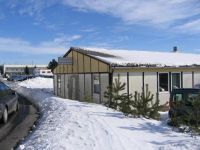 On the initial notes you send us you can say if you would like tuition each day that focusses on the vocabulary you will meet (perhaps when you go into a historic mine) and the transactions you may like to carry out for yourself, ordering from the lunch menu, for instance.
On the initial notes you send us you can say if you would like tuition each day that focusses on the vocabulary you will meet (perhaps when you go into a historic mine) and the transactions you may like to carry out for yourself, ordering from the lunch menu, for instance.
We offer an outright language school package, if you prefer, with immersion to support you in preparing for the kleines Deutsches Sprachdiplom or for the DSH. Language-learning often means separate holidays for different family members, but because we offer individual service you may find we can offer one member of the family intensive teaching while the rest of the family is out and about in the area.
East Germany - past & present
Despite the scenes of jubilation when the Wall came down - or perhaps just because of them - there can still be a feeling in the rest of the world that East Germany is at best an unknown quantity and at worst an area still stuck in a sort of time-warp.
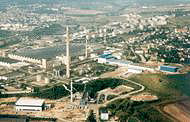 All the more reason for you to come and test out for yourself the comfort and hospitality available here, while you still catch glimpses of the history made by the people who lived here in times long past, in the GDR period, and even before and during World War II.
All the more reason for you to come and test out for yourself the comfort and hospitality available here, while you still catch glimpses of the history made by the people who lived here in times long past, in the GDR period, and even before and during World War II.
People here are conscious of the aspects of modern German history with which the world will ever reproach them; they have preserved Buchenwald in sad memorial. If you would value a German companion on a visit there, you will not lack for offers to accompany you on the pilgrimage.
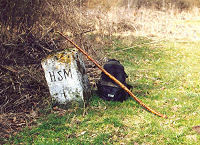 This ownership of the past is a most impressive characteristic of people in East Germany. When the GDR time is mentioned there will be a wryness or nostalgia but always a rich vein of conversation.
This ownership of the past is a most impressive characteristic of people in East Germany. When the GDR time is mentioned there will be a wryness or nostalgia but always a rich vein of conversation.
And if you come with a need to revisit wartime memories of your own, English in Germany can help in many ways. You may wish to see records of births, marriages, deaths; you may be glad to visit restored synagogues; you may be an A-Level student whose project was inspired by a grandparent's memories; we will gladly weave a "learn while you're here" element into your individual holiday.
Celtic Interest 
Those who are pursuing an interest in Celtic settlements could well start in this area, 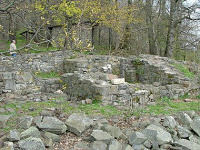 for in the Schiefergebirge (slate hills) of Thüringen there are whetstones they made recognising the geological composition of the greywacke.
Settlement in the Ilmkreis goes back about 4,000 years and we will gladly work out a trail for you around the many traces of the Celts and of even earlier peoples. for in the Schiefergebirge (slate hills) of Thüringen there are whetstones they made recognising the geological composition of the greywacke.
Settlement in the Ilmkreis goes back about 4,000 years and we will gladly work out a trail for you around the many traces of the Celts and of even earlier peoples.
And if you are in serious pursuit of man's earliest traces in Thüringen, you may well already have heard of the Bilzingsleben, where excavated homo erectus fossils and settlements date back 370,000 years.
Geology 
A starting point for amateur geologists is the fossil flora of the Manebacher Schichten (strata found at Manebach) of which there are examples in many international museums, thanks to the work of classification by mining enigineers associated with Goethe. 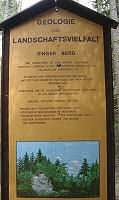 The geological conditions leading these men to sink a mineshaft where they did are themselves of great interest to the geologist. The geological conditions leading these men to sink a mineshaft where they did are themselves of great interest to the geologist.
The mining history of the Schiefergebirge (slate hills) of Thüringen, which still experience some tectonic movement, includes the extraction of ore for the making of chemicals and exploration for uranium. There are many examples of fascinating caves, not only in the slate hills, but also in the karst limestone areas. They are of general interest to all tourists, and in certain cases open for weddings or for the treatment of respiratory diseases.
If it is with a major interest in geology that you visit the region, you will find features and local experts to inspire you to turn a short holiday into a long exploration when opportunity presents.
Goethe, Bach & Co 
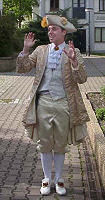
In the outside world, it is with Germany in general that the many "greats" whom Thüringen claims are associated.
From St. Boniface to Bach, from Fröbel (the founder of the Kindergarten) to Hegel and Nietzsche - all did seminal work in this region, and there is much to learn from visiting the sites associated with them.
Ilmenau itself is recorded in Goethe's works, and he wrote of it to Schiller, who was one of the literati gathered at that time in Weimar, known as the "Weimar Klassik": "Ich war immer gerne hier".
Faust and other Legends 
The original Dr. Faustus, who was a contemporary of Luther is known to have visited the area and one record suggests, 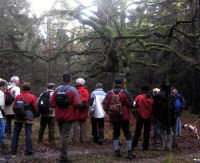 that he actually enrolled at the Theological University of Erfurt. The “Philosopher’s Stone” was one of his concerns and there is much food for thought in how the society of his time was both attracted and repelled by the claims of such people to magical powers. that he actually enrolled at the Theological University of Erfurt. The “Philosopher’s Stone” was one of his concerns and there is much food for thought in how the society of his time was both attracted and repelled by the claims of such people to magical powers.
A place to reflect on societys views of wizards and witches, would be the wooded Hörselberg with its Tannhäuser Legends, immortalised by Wagner. It is also one of the places in Thüringen strongly associated with Frau Holde firstly as a bringer of fertility, then vilified as a witch. Her persona as Mrs. Holle in the fairytale collected by the brothers Grimm in the 19th century reflects the earlier stage of belief.
Come to explore these themes, and the Network will introduce you to researchers and give linguistic help. Or simply come to walk through woods where visions of Red Riding Hood are easy to conjure up!
Castles and Palaces 
Among the monuments to the history, particularly the times when the immediate region of Ilmenau was shared by two or three landgraves, are the castles seen from the main East-West motorway, the A4.
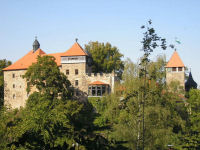 They bear witness to the major ancient trading routes which converged on the pass over the ridge of the Thüringer Wald. Nearer the A71 is the castle at Elgersburg, which has the distinction of never having been sacked. The others were at times taken over bandit knights, so that the trading routes must have been fraught with much danger.
They bear witness to the major ancient trading routes which converged on the pass over the ridge of the Thüringer Wald. Nearer the A71 is the castle at Elgersburg, which has the distinction of never having been sacked. The others were at times taken over bandit knights, so that the trading routes must have been fraught with much danger.
Ilmenau itself has a history of being pawned by one or other of the landgraves and in this time of relative poverty, the buildings were mainly of wood. The only part of a palace to survive the many great fires in the town is the Alte Försterei.
When you visit the area, be sure to take up our offer of finding you a guide so that you are not sightseeing with unseeing eyes.
Village Treasures 
It is easy to pass over villages on holiday - back home, it is the capital cities and cathedral towns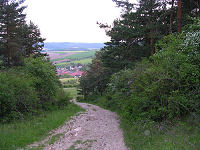 that will have registered. But in Thüringen, every village has a story. It may even have its castle, as Elgersburg does. In Dornheim the church is where J.S. Bach was married. In Kleinhettstedt the mill which once contributed to a collective is now grinding mustard in 14 different variations, a very special accompaniment to Thüringen's Bratwurst. Each day of your holiday could be spent in a different village, training your eye to the architectural and geological detail which speaks of life here today and yesterday. that will have registered. But in Thüringen, every village has a story. It may even have its castle, as Elgersburg does. In Dornheim the church is where J.S. Bach was married. In Kleinhettstedt the mill which once contributed to a collective is now grinding mustard in 14 different variations, a very special accompaniment to Thüringen's Bratwurst. Each day of your holiday could be spent in a different village, training your eye to the architectural and geological detail which speaks of life here today and yesterday.
There are guides and tutors who will delight in passing on to you local history, and hearing your reflections and comparisons emerge with the place you came from.
Industrial Archaeology 
The area around Ilmenau is full of interest for anyone fascinated by glass blowing,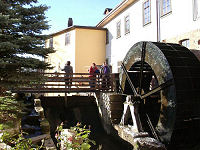 porcelain manufacture or the idea of restoring an ancient watermill and being paid for the electricity it generates for public use. German "Vorsprung durch Technik" has been here for a long time, witness not only the mining museums but also the many other technical monuments, including one of Europe's greatest steam hammers, itself a replacement for water-driven hammers, dating from 1482. With up-to-the-minute input from establishments such as Ilmenau's Technical University, the area has examples of technology for the future. There are exhibitions in support of new hydroelectric schemes or workshops are available on solar technology. In the Network there are guides who work with our interpreters to give you a full understanding across the language barrier. porcelain manufacture or the idea of restoring an ancient watermill and being paid for the electricity it generates for public use. German "Vorsprung durch Technik" has been here for a long time, witness not only the mining museums but also the many other technical monuments, including one of Europe's greatest steam hammers, itself a replacement for water-driven hammers, dating from 1482. With up-to-the-minute input from establishments such as Ilmenau's Technical University, the area has examples of technology for the future. There are exhibitions in support of new hydroelectric schemes or workshops are available on solar technology. In the Network there are guides who work with our interpreters to give you a full understanding across the language barrier.
Herbs and Alternative Medicine 
You are probably well aware that traditional medicine can be just as efficacious as the chemical sort.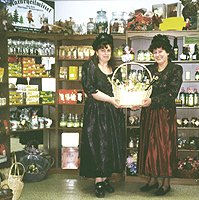 For centuries, Europeans living as far away from Thüringen as Amsterdam depended on the arrival of the "Buckelapotheker" (or "humpbacked apothecary") who had borne the salves and herbs of Thüringen on his (or her) back for distances of up to 600 kilometres. For centuries, Europeans living as far away from Thüringen as Amsterdam depended on the arrival of the "Buckelapotheker" (or "humpbacked apothecary") who had borne the salves and herbs of Thüringen on his (or her) back for distances of up to 600 kilometres.
Locals and visitors alike remain fascinated by the routes taken and by the Thüringer Kräutergarten (or "herb garden") itself which stretches over an expanse of more than 80 square kilometres.
Why not pay a visit to an original workshop and, with the assistance of an interpreter, discover the cultural and historical impact of how and where these salves were made. Whether your interests lie in herbal teas, hop pillows, soothing ointments or the uplifting qualities of natural schnapps, the "Giftmischer" offers exciting explanations of them all. From his abode you can survey the breathtaking expanse of the Thüringen hills where the herbs were (and still are) grown.
|
|